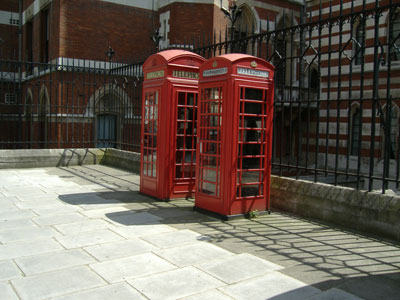But London is actually well prepared for this emergency. Unlike Paris, Chicago and New York (where making transit strikes illegal did not prevent one), London’s buses and underground are organized in a manner that provides riders with an alternative.
The key is competitive tendering (competitive contracting) of bus service. One of the Thatcher government's most successful reforms was its reorganization of transit in London. It began in 1985, when a small part of the world's largest public bus system was put out to competitive bid. London Transport retained control of the schedules, fares, logos and bus liveries, so that the now privately operated services were an integral part of the system. Riders did not know the difference between the public and private services, until a few years later when the privately operated services began achieving better service reliability than the public services.
By 2000, the entire London bus system had been converted to competitive tendering, with multiple contractors providing the service. Costs per mile dropped by 50%, adjusted for inflation, while service was expanded and ridership rose. Regrettably, some of the efficiency gains were lost once Ken Livingstone assumed the mayorality of the new Greater London Council, while Transport for London (the successor to London Transport) failed to pay sufficient attention to retaining economic competitiveness between the contractors. Still, things are far better today than they were 25 years ago.
This competitively tendered bus system makes it possible for underground riders to get to their destinations by bus, albeit somewhat more slowly.
 Having an alternative is crucial. I recall that in response to a Southern California Rapid Transit District (SCRTD) bus strike (Note), I asked the Torrance and Gardena bus operations to "open their doors" as they traveled through low-income south central Los Angeles on their way to downtown (regulatory restrictions required them to operate in "closed door more" so as not to compete with the services of the larger Southern California Rapid Transit District). It was not long before one of my fellow Los Angeles County Transportation Commission members complained to Mayor Bradley (who had appointed me), which resulted in my withdrawal of the request. My colleague had been more concerned about the good of already well compensated transit employees to a greater extent than south central Los Angeles residents who relied on the buses for their livelihood (granted, this geographic area was outside the electoral constituency of the member).
Having an alternative is crucial. I recall that in response to a Southern California Rapid Transit District (SCRTD) bus strike (Note), I asked the Torrance and Gardena bus operations to "open their doors" as they traveled through low-income south central Los Angeles on their way to downtown (regulatory restrictions required them to operate in "closed door more" so as not to compete with the services of the larger Southern California Rapid Transit District). It was not long before one of my fellow Los Angeles County Transportation Commission members complained to Mayor Bradley (who had appointed me), which resulted in my withdrawal of the request. My colleague had been more concerned about the good of already well compensated transit employees to a greater extent than south central Los Angeles residents who relied on the buses for their livelihood (granted, this geographic area was outside the electoral constituency of the member).
It is well to remember the less than sage views of Herbert Morrison, Deputy Prime Minister to Clement Atlee in the United Kingdom in the late 1940s. Morrison, the founder of the publicly operated London Transport opined that conversion of privately operated services to publicly operated services would be more efficient and better serve the public because public employees would be driven by an ethic of public service. While Nobel Laureate James Buchanan and the public choice school of economics put an academic end to such muddled thinking, London Underground's workers are in the process of providing even more tangible evidence.
----
Note: SCRTD was the operating predecessor to the current Los Angeles County Metropolitan Transportation Association. The board on which I served, the Los Angeles County Transportation Commission was the policy predecessor.
---
Photograph by the Author













manufactured-homes-reverse-mortgage
Reverse Mortgages are designed to enable senior homeowners 62 years and older to convert part of their home equity into cash. They can do this without having to sell their home or give up the title. Seniors do not have to take on any new monthly mortgage payments either (although they are required to continue paying their property taxes and homeowners insurance). Instead of making monthly payments to a lender, the reverse mortgage lender makes payments to the senior homeowner.
http://www.reversemortgagelendersdirect.com/manufactured-homes-reverse-m...
You're Wrong
Hi Wendell,
I'm just a transit geek, I don't have any particular qualifications. Respectfully, I think that you are completely wrong here. The privatization of the London system was DISASTROUS. Here is an in-depth video on transit privatization (only one I could find). Watch this and tell me what you think.
http://www.youtube.com/watch?v=xAmnmehAy3w
Excellent piece, Wendell. I
Excellent piece, Wendell. I did not know about this. I only wish that a similar competitive bidding process could be instituted here in NYC. It's amazing that costs dropped 50% in London!
I can't imagine how up-in-arms the unions must have been at Thatcher. I guess that's why they call her the Iron Lady.